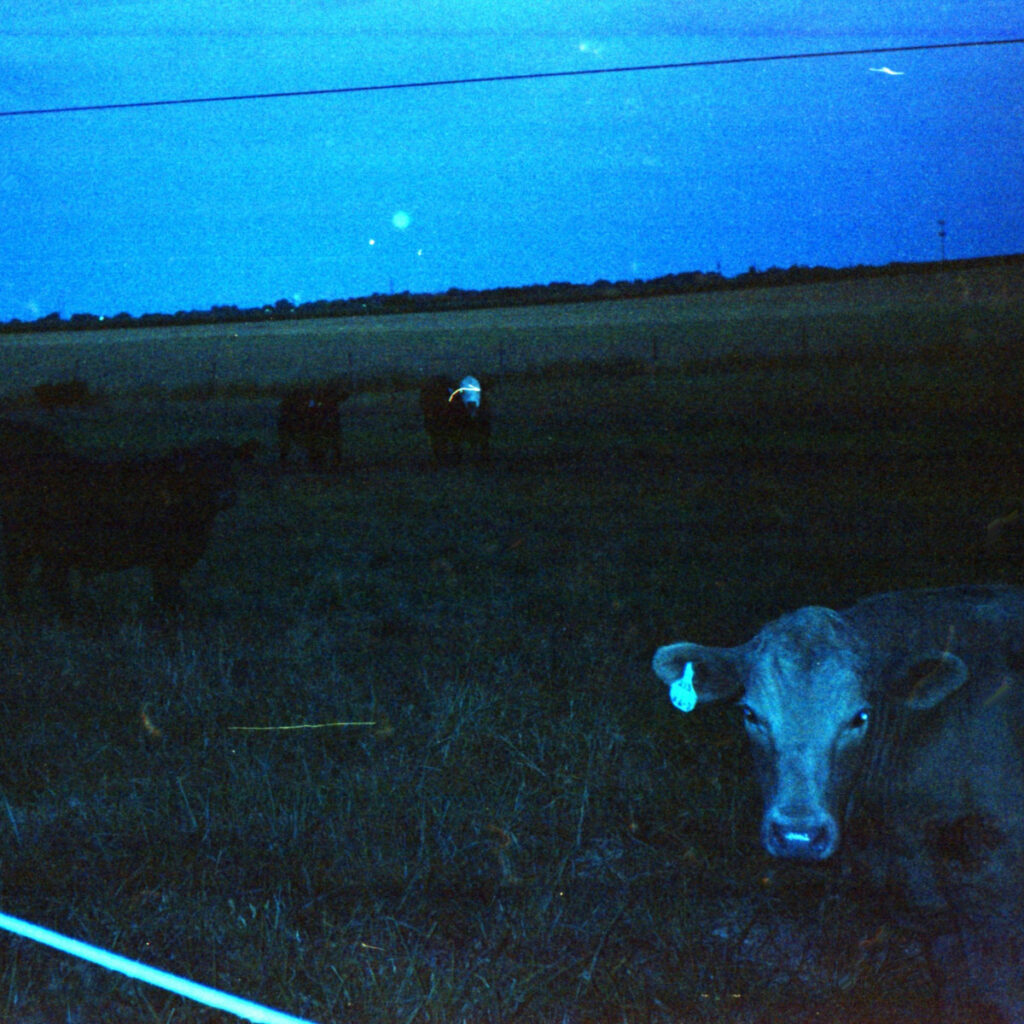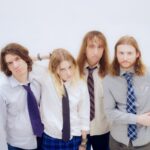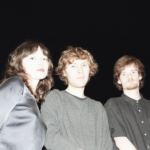Artist Interview: waveform*
Posted: by The Alt Editing Staff

Contrary to what its title suggests, waveform*’s forthcoming 5th album Antarctica feels warm and thoroughly lived-in, from the hazy reminiscing on opener “Lonely” to the soft, understated fuzz of promotional single “In My Drink” to the moonlit credits sequence of “Orphan Child.” The Connecticut lo-fi duo– consisting of high school friends Dan Poppa and Jarrett Denner –are fresh off a run of shows at South By Southwest and will soon embark on a star-studded summer tour supporting modern shoegaze titans They Are Gutting A Body Of Water and Teethe. I had the honor of catching up with Dan and Jarrett over Zoom to talk about the band’s origins, the evolution of their creative process, and the inspirations behind Antarctica (out 5/12 on Run For Cover Records).
***
Alt: I wanted to start out by asking a little bit about the band’s history. I know you’ve been at it for a couple years now, so how did you two meet and how did you—either together or individually—decide to start making music?
Jarrett: We met because we’re from the same town and we went to the same school and my sister posted an Instagram video of me playing guitar—like a “showing off her little brother”-type thing. Dan saw it and DM’d me and asked me to play guitar and sing in his band where he would play drums. That was originally what the band was, and that’s how we became friends.
Alt: And did you guys know already that you each wanted to make music? How did that kind of come to fruition in the beginning?
Jarrett: I had a lot of music appreciation in my family and Dan did as well. I picked up guitar in middle school, and then it was just the only thing that I ever thought about from then until now. I don’t know if Dan has another answer.
Dan: Similar thing. The same, even. I just wanted to play drums for a while and then I randomly wanted to play guitar. I don’t know what happened from there.
Alt: I remember reading somewhere that both of you start off by writing songs separately and approach each album like it’s a split. I was curious as to whether that’s still your approach to songwriting or if it’s changed over the course of five albums.
Dan: It’s still the approach to songwriting, but when we made this upcoming album, we collaborated more and recorded together.
Alt: So it was kind of a long distance recording process on the previous albums?
Dan: Mm-hmm. A lot of the time, not all the time.
Alt: At what point does that process become collaborative? Like at what point do you kind of let each other in and start making tweaks to one another’s songs?
Dan: I think when we fully decide that we’re gonna use whatever song on the album, then we actually work on it together.
Alt: Have either of you adopted the habits of the other when writing songs or seen the other band member approach songwriting in a particular way and thought like, “Oh, I’m gonna start doing that”—is there any cross-influence there?
Jarrett: I think there is, but I don’t think it’s ever purposeful. There are just times where we’ll both send each other a song and be like, :”I randomly made a song that sounds like you wrote it.” But I feel like that’s as far as it goes in terms of our styles of songwriting influencing each other. I think if Dan makes something that really impresses me, it definitely inspires me to just make like my own song generally. But I feel like we kind of stray from like—we don’t really want our styles to become the same thing.
Alt: Yeah. It’s interesting because even though you have very distinct songwriting styles, it feels like when those songs come together on a record, there’s an equally distinct collective or joint style that really reflects both of your strengths, which is really interesting and gives it a very cohesive feel.
Jarrett: Thanks!
Alt: I know you have similar influences. You’ve both mentioned being big Alex G fans. Do you have any other areas of overlap? Or conversely, artists that one of you really loves and is really influenced by and the other isn’t at all?
Jarrett: For the most part, we have an absurdly compatible music taste, but there’s like the occasional artist that we’ll like, beg each other to get into. Like I wanted Dan to listen to Radiohead for years. And I feel like Dan is always finding smaller artists to show me.
Dan: I like underground music, he likes popular music.
Jarrett: Yes.
Alt: Which Radiohead album did you suggest to him to get started?
Jarrett: I was telling Dan to listen to OK Computer and then (Dan holds up a Kid A CD) you got really into that one just to spite me, even though I wanted you to listen to the other one. But that one’s good too. That one’s definitely good.
Alt: Let’s talk about Antarctica a little bit: it’s your fifth album. Do you kind of know what to expect going into writing an album at this point? Are you kind of keeping a consistent approach to that? Has anything transformed or shifted at all?
Dan: I think it’s sort of the exact same thing, but it comes out different every time because of a lot of reasons. Besides the fact of us trying to record together—that was something that we did on purpose. Other than that, it’s the same. Like when we write a song, I think we still do the same thing that we did when we made stuff five years ago.
Alt: And is this the first time you’ve recorded an album together?
Dan: We’ve done it before and we used to do it more so when we started. But we sort of tried to record every single song in the same room—except for some exceptions with vocals and stuff—just so that we’d both be there when most of it happened.
Jarrett: Yeah, I think this was the first time that we purposefully collaborated on every song.
Alt: When you say you, the first time you purposefully collaborated on every song, what does that look like? What does purposeful collaboration mean to you in that way?
Jarrett: I think in the past if any collaboration happened, it would be so spontaneous. Like I would send Dan something and he would just kind of add stuff to it without me necessarily asking, which always turned out good. Whereas with this process, it was like, “let’s hang out because I wanna hear what you have to say about this song,” which wasn’t what it was like before.
Alt: Do you think there’s any newer influences, sounds, or areas of previously untapped inspiration that you drew from in the process of putting together Antarctica?
Jarrett: That’s a good question. I think we just lived unbelievably sheltered lives the years prior to this record. And then the two or three years before we wrote this record was when I felt like we went through so many changes, which I think influenced the album a lot. But as far as musical influence, I honestly think we’ve listened to the same stuff since we were both like 16.
Alt: When you talk about like two or three years ago and those significant changes, is that lockdown related or other stuff?
Jarrett: I mean, that was [when I was] between 18 and 21, which is just like, a classic insane period of time. At least that’s what they tell me. I mean, Dan’s older than me, but I think he was like, 20 and 22 or something. I think it was just a tumultuous era for both of us and obviously the world, but that’s kind of been over-spoken about.
Alt: And you feel like that’s carried into the sound of the new record?
Jarrett: Yeah. I think so. There’s just a lot more, like, characters in the stories on the album. Whereas our other stuff was really just about what it’s like to sit and stare at a wall or something.
Alt: When you say characters, do you mean like fictional stories? Or is it drawn from personal experience?
Jarrett: Definitely a mix of both. There’s fictional tales on there, but there’s also extremely real stories as well.
Alt: I wanted to talk a little bit about the visual element accompanying this album cycle. What immediately caught my eye on all of the promotional material was that specific shade of blue and the very memorable visual aesthetic of it all. I wanted to ask you a about how that fits in with the music itself, whether one inspired the other, and what it’s meant to convey about the band’s current era.
Dan: The album art is just a picture that our friend took that we thought looked cool to use. For a couple of the singles, we used an animation of it. I think it just keeps popping up a lot on everything that we post for the album. But not necessarily like, the colors and stuff aren’t necessarily a purposeful thing, but it all randomly works in a cool way.
Alt: I also wanted to talk a little bit about some of your contemporaries. You guys are a part of this really exciting new wave of grunge and shoegaze bands. You’ve toured with Momma and Horse Jumper of Love, and you’re about to go on this big summer tour with They Are Gutting A Body Of Water and Teethe. Do you feel like there’s a communal element to this moment in shoegaze?
Dan: I think the scene that we exist in is just all of those bands, pretty much. And it’s not even just like shoegaze and rock, it’s like a lot of indie stuff and lo-fi stuff and stuff that sounds like Alex G and My Bloody Valentine. But it’s all people who’ve been friends for a bunch of years and we all just randomly got grouped into the same thing online.
Jarrett: I honestly think that there’s more of a sense of community than people who come to like our shows and our friends’ shows might even realize. It’s awesome to get involved in because it is a really big network. It’s very connected.
Alt: You mentioned knowing a few of these musicians for years, are there any that you like go way back and how’d you meet?
Jarrett: Our friend Brendan in the band Milly from LA is like, a super way-back pal. We’ve been friends with (Dan holds up a Milly cassette) oh, the Milly tape. Yep. The Milly cassette. That’s like, the original one. We’ve been friends with TAGABOW and Teethe for a long time too. All pals.
Dan: It’s like we’re bragging about being friends with famous people.
Alt: Nah, it doesn’t feel like that at all. They’re probably bragging about you too. A lot of these bands seem to be coming out of these like very densely populated local scenes. Philly is the obvious one, but also New York and LA and cities like Asheville are really popping off. You’ve mentioned in past interviews that waveform* was born almost out of a lack of a local scene in Connecticut. Has that changed at all since you guys started making music? Like is there such a thing as “Connecticut DIY” in the way that other like locales have distinct independent music scenes?
Dan: There’s always a scene in Connecticut and there’s a bunch of DIY venues right now. I think when we talk about our place in that, it gives people the wrong idea or something. That’s a whole thing to get into. We played a lot of shows there, which was cool. But the bands that we always felt we were similar to and the ones that we were mainly friends with since we started were like all the people that we’ve been mentioning. It felt like what we did mainly existed for online purposes. Like our scene exists online to me because everybody is from a different place. But I would even say bands from Philly who are similar to us—like, there’s a scene in Philly that’s really dense, but all those bands still do exist in this, like, online scene too. It’s not a dig at Connecticut.
Alt: Do you feel like having these online communities has—not replaced local ones, but has kind of expanded the idea of what a DIY community could be?
Dan: I think so, yeah.
Jarrett: I think an important distinction in characterization of Connecticut is that like—I think if you’re a band in Connecticut, it’s important to become part of the tri-state scene because Connecticut is such a small place. But for what it is it’s impressive how many DIY organized things happen, especially before the pandemic. But we’ve just always been like, an internet thing.
Dan: Everyone that does DIY stuff in Connecticut is cool and nice, and there’s a lot of cool places that come and go.I feel like what I’m trying to explain, or rather what we’re trying to explain is like—it sort of feels like our “scene,” whatever it’s called, is similar to like, the early-to-mid 2010s. Like bands like Alex G and Teen Suicide, sort of existing in this weird tape-label sort of space online. And then all those bands play shows together a lot, but are all from different places.
Alt: In the 2010s Alex G and Teen Suicide and bands like that really found their home on Bandcamp and Tumblr, and now that Tumblr isn’t as much of a hub for DIY anymore. I know you mentioned Instagram earlier. Do you think there are certain platforms where that community really lives? Or is it more decentralized at this point?
Dan: I would say decentralized. Instagram is definitely the main source of social media, but it’s so broken at this point, obviously.
Jarrett: I would say like really small bands are finding each other on Spotify and then DMing. Artists being like, “hey, I like your music, we should play a house show.” You know what I mean?
Alt: What part of Connecticut you guys are from?
Jarrett: We’re from Monroe. It’s a really small town between Trumbull and Newtown. It’s like mini-Newtown. I’m there right now, but I think I’m moving back to New York in the next few months.
Alt: Do you have any favorite cities to play in? Or cities that you’re most excited to visit or perform in?
Dan: I’m most excited for Montreal.
Jarrett: I like Portland, Oregon. I’m excited for that. And I like being in California—it’s utopian in the weather. I don’t know about living there, but it’s an awesome place to visit. And I think New York will be fun.
Alt: You guys played South by Southwest this year, right? How was that?
Dan: It was cool. We’ve done it twice, but we haven’t really done, like, the full thing that you’re supposed to do, where you play like 20 shows every day. Last year we played two shows and this year we also kinda played two shows. But it was dope. We just like seeing bands better. Or not better, but that was the most fun thing to do.
Jarrett: It’s like the only thing I would go on the record speaking positively about is seeing a bunch of bands. That’s like my reason for going. I just like seeing people play music.
Alt: Who were some of your favorites?
Dan: Teethe and TAGABOW.
Jarrett: We saw Hello Mary and they ripped. And Blaketheman1000. I saw almost everybody that we both mentioned in a convenience store that we were two minutes down the street from, but didn’t know it was happening until everyone was done playing. It was TAGABOW, Knifeplay, Blaketheman, and Frost Children.
Alt: Sounds like a sick lineup. Do either of you have a favorite song on the upcoming record?
Jarrett: I’ll be good. I’ll choose one of Dan’s songs. I think I’m most excited for “Clarity” to come out because it’s not a single. But it could be a single, that’s how frickin’ good it is.
Dan: I have two answers. I have my actual answer, and then I have like, the fake interview answer.
Alt: I think I wanna hear both.
Jarrett: Yeah, I wanna hear both.
Dan: The fake interview answer is when people say they can’t pick a favorite because they view their songs as if they’re, like, their children, which a lot of people say in interviews. And then the actual answer is probably “In My Drink.”
Alt: And that’s why it’s the single!
–
Grace Robins-Somerville | @grace_roso
The Alternative is ad-free and 100% supported by our readers. If you’d like to help us produce more content and promote more great new music, please consider donating to our Patreon page, which also allows you to receive sweet perks like free albums and The Alternative merch.










